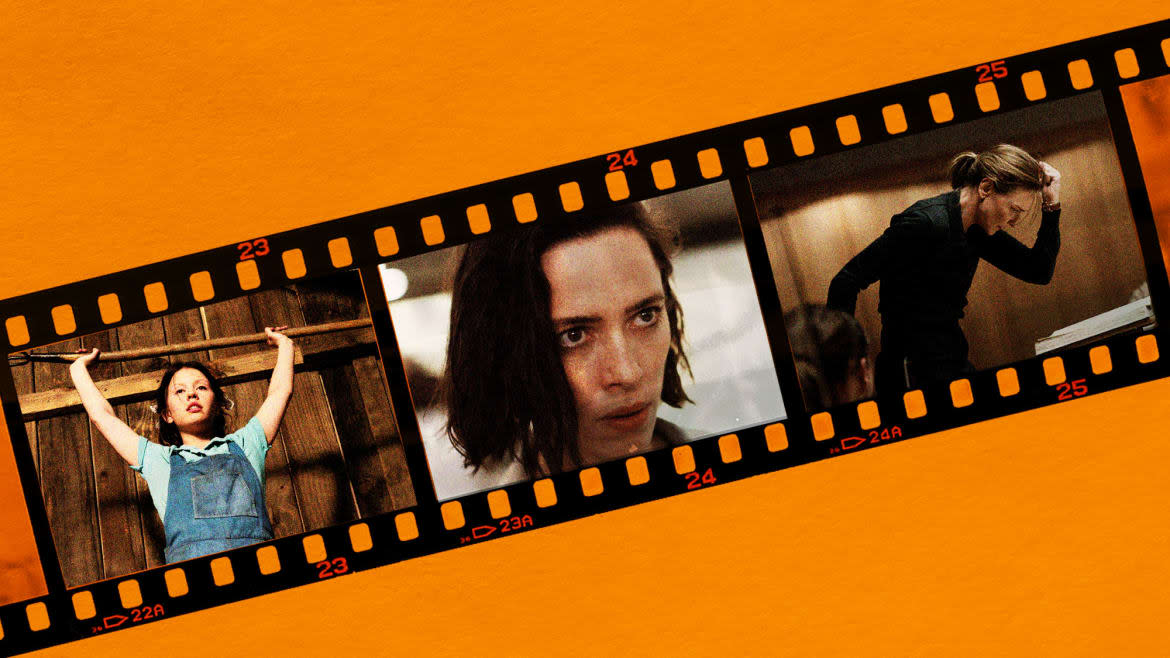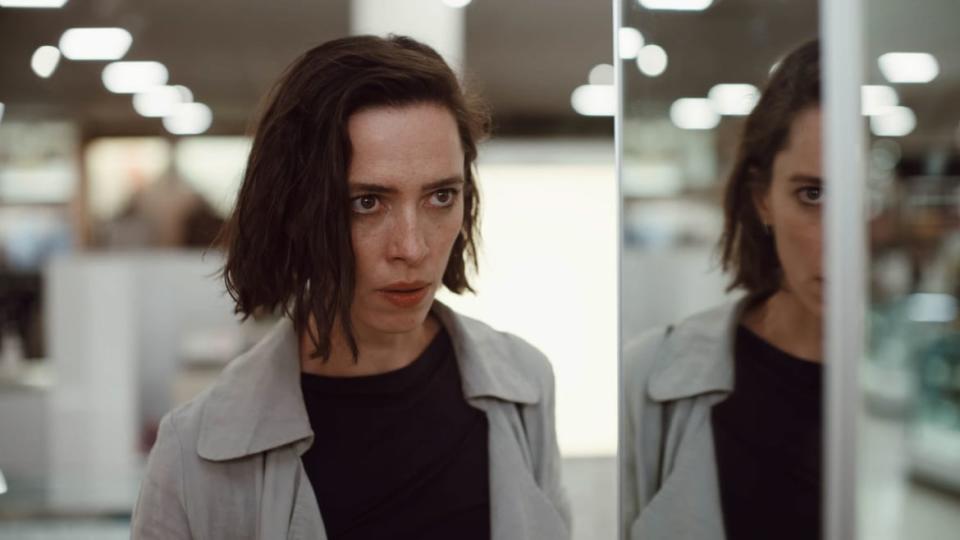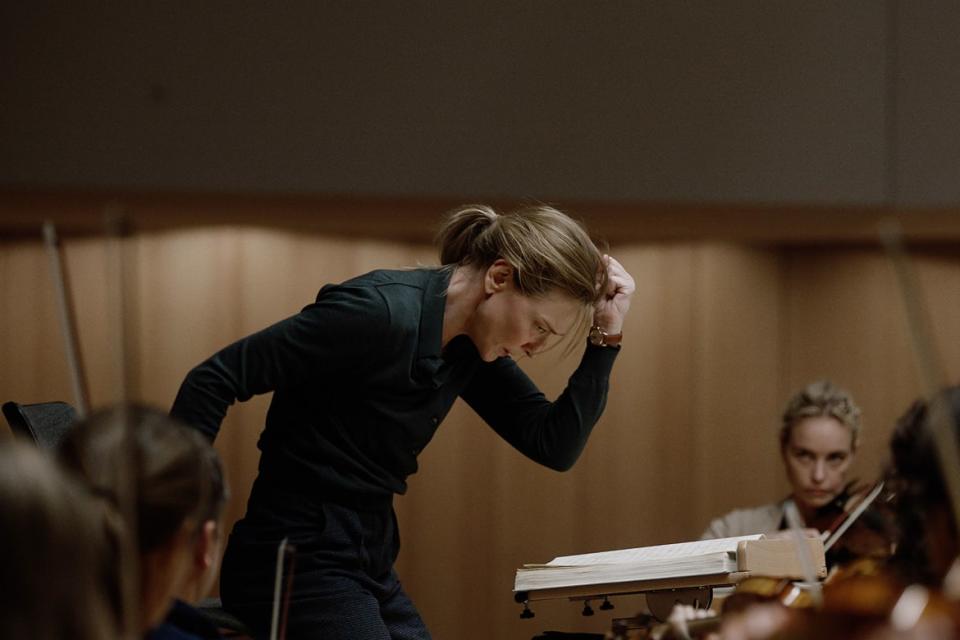The Three Must-See Movie Monologues of the Year

- Oops!Something went wrong.Please try again later.
There is a certain subset of Twitter and the Internet at large that thrives whenever actresses are acting. I know that sounds like an inexplicable and rudimentary—almost inane—statement, but it’s true. There are things like Media Twitter, Stan Twitter, and Queer Twitter. And there very much is Actresses Acting Twitter. (Actually, that and Queer Twitter may be one in the same.).
As a proud member of all three of those communities, I invite you to join me today, so together we can celebrate the greatest phenomenon that occurs within the craft of Women Acting: the monologue.
This year, we’ve been treated to several. Mila Kunis, Renate Reinsve, and Bella Ramsey have all given some moving speeches in their respective films. And that’s just to name a few!
But none have been quite so memorable as the monologues performed by the leads in Pearl, Resurrection, and TÁR. What’s more, is that the astounding monologues performed in these films are all done in one shot.
As a quick note: one-take and one-shot are often used interchangeably, and normally that’s fine, as you can typically discern what someone means depending on the context. But I want to be sure everyone understands what I’m talking about here. These monologues were not necessarily done and wrapped in one single take, but rather occur as one long shot; a trick of the camera that requires every element to be just right or it risks falling apart, necessitating another take.
Cate Blanchett Deserves Better Than Your Bad Movie Etiquette
These are monologues that test what performers are capable of, digging down to the grisly ennui of humanity and womanhood, laying the characters bare for the audience. Each one is unforgettable—the kind of knockout performances that remind us that, in the dark of the theater and under the spell of the performers stretching up eighty feet in front of us, we can feel every emotion at once.
Both Resurrection and Pearl are relatively lean films. Their intention is to pull in focus on the fragile psyches of their lead characters, maximizing the emotional payoff with a minimal budget. They’re stylish and beautifully crafted. Pearl’s technicolor landscapes reflect its titular protagonist’s artificiality, as Pearl tries to make herself seem like a normal girl amidst the chaos of WWI-era despondency. Elsewhere, Resurrection’s sparse gray color palette and brutalist concrete buildings loom over its lead like the haunting past she’s long tried to escape.
Resurrection stars Rebecca Hall as Maggie, a woman who comes face to face with her abuser for the first time in 20 years, and learns that his hold on her is not nearly as depleted as she would’ve liked to believe. It’s quite an antithesis to Pearl, in which Mia Goth embodies the titular role (for the second time this year) of the lethal sociopath who’s determined to escape her family’s farm for a life of stardom, no matter the cost. But though the films are so different in their nature, both Goth and Hall deliver pivotal monologues that ground their characters and all of the complicated decisions they make throughout.

https://www.thedailybeast.com/obsessed/rebecca-halls-7-minute-monologue-in-resurrection-is-a-tour-de-force
In Resurrection, as Maggie begins her speech, delivered to an intern in her office, things start heavy and somehow become more horrific throughout seven uninterrupted minutes. Maggie slowly unpacks her trauma, letting it all spill out slowly, like a viscous poison that has long been pumping through her veins. Hall lets each revelation about her character’s past fall and land with the intensity of a grenade with a rickety pin—every word feels like it has the power to level the building.
Pearl’s monologue isn’t so much about revelation as it is about admission. The audience is already aware of what Pearl is capable of, it’s likely the reason they paid for the ticket to see her gallivant around her farm with a razor-sharp pitchfork. But Pearl’s existence as a prequel to X serves to answer questions about how Pearl became such a bloodthirsty killer. Throughout the film, we watch her descent into unfettered madness, a state she feels much more comfortable in than reality. But when stardom remains out of reach even after all of the nefarious deeds she commits to give herself a leg up, Pearl is thrust back to the tipping point of sanity for one last bout of clarity.

Running just longer than Resurrection’s seven-minute monologue, Pearl’s one-shot focuses on Goth’s mascara-stained face as she retreats into her character’s darkest anxieties. “Seems like there’s something missing in me that the rest of the world has,” Pearl says. For her, there are several missing pieces: love, attention, purpose, and stability. It’s all boiled over into a vengeful, jealous rage. “It’s an awful feeling, like a rot, the way it just twists and turns at your insides,” she tells her sister-in-law. Goth’s natural, high vocal register and traces of her British accent are nowhere to be found, here. She disappears into Pearl without a single cut. And then, as Goth told me last month, she and director Ti West would do it all over again.
Perhaps the crowning achievement of this year’s selection of one-shot monologues isn’t really a monologue at all, but I’m sneaking it in because it’s just so damn arresting. By now, you’ve surely heard about what a force Cate Blanchett is in TÁR. If not, trust me when I say that you should run out to the nearest theater that’s screening the film to see it for yourself, now that it has finally expanded nationwide.
TÁR is a complex character study of fictional maestro Lydia Tár, played by Blanchett. She’s worked her way up in the classical music scene not by being showy, but by being the best. Lydia’s reverence has lent her a great deal of power, and the film is a magnificent examination of the inherent toxicity that comes with it. TÁR may be the first film to finally nail the nuances of so-called “cancel culture”—a term that almost feels primitive when discussing a work of this magnitude—and its most memorable scene finds the maestro jumping back and forth between brilliance and belligerence.

While teaching a class at Julliard, Lydia does some good-natured sparring of wits with a student who doesn’t agree with her lauding of Bach as one of the great composers, citing his racism and other improprieties. Lydia takes this as an opportunity to school her pupil on what she says music—particularly classical music and conducting—is really all about. “If you want to dance the mask, you must service the composer,” she says. “You must stand in front of your audience and God and obliterate yourself.”
Lydia’s insistence that one must compromise their identity and morality for the craft is presented at the tail end of a take that continues for more than ten minutes, completely unbroken. By the time it finishes, you feel as though you’ve just been privy to an anthropological documentary, some reflexive study of human nature. It’s staggering, and, because of its enormity, you initially become convinced that Lydia Tár is correct: sacrificing your humanity is necessary to appreciate art.
Rebecca Hall’s 7-Minute Monologue in ‘Resurrection’ Is a Tour de Force
That is, of course, wrong. And that’s what’s so dazzling about this particular one-shot. Blanchett may not be monologuing per se, but the focus remains firmly on what the character wants you to believe. It’s so convincing that you’ll spend the rest of the film trying to work out whether or not Lydia Tár’s perspective—and all of the undeniable talent and intelligence that led her there—has some modicum of truth at the heart of it.
That’s what all of these performances do so well: they bore into the audience to make us participants, pondering other realities with empathy instead of just sitting rigid as mere spectators. Resurrection, TÁR, and Pearl may not have much in common thematically, but each one is a testament to the immense power of its lead actress.
All of these monologues are Oscar-worthy, which is a shame because both Pearl and Resurrection veer on horror, meaning they’re likely to be shut out by the Academy. The powers that be have never taken kindly to horror, unless it’s such a cultural phenomenon that it’s impossible to ignore (see: Jodie Foster in Silence of the Lambs). Maybe there’s a chance that the sheer excellence of these films—and the amount of organic buzz they’ve generated—will turn that around, and next year they will compete alongside the more Oscar-friendly TÁR. If that’s not the case, and you find me talking to myself out on the street about how good these scenes are, just call it my own one-shot monologue.
Get the Daily Beast's biggest scoops and scandals delivered right to your inbox. Sign up now.
Stay informed and gain unlimited access to the Daily Beast's unmatched reporting. Subscribe now.

